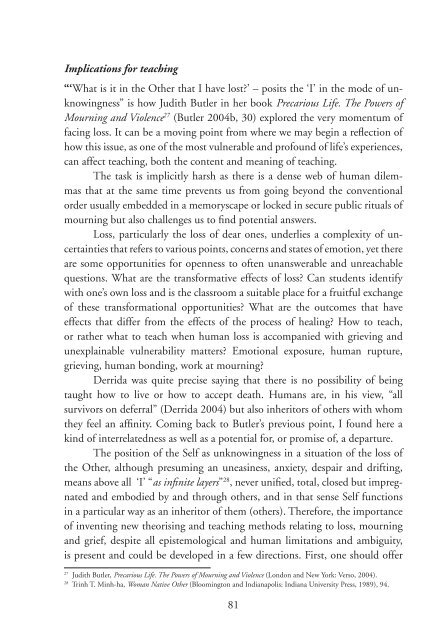Teaching Subjectivity. Travelling Selves for Feminist ... - MailChimp
Teaching Subjectivity. Travelling Selves for Feminist ... - MailChimp
Teaching Subjectivity. Travelling Selves for Feminist ... - MailChimp
Create successful ePaper yourself
Turn your PDF publications into a flip-book with our unique Google optimized e-Paper software.
Implications <strong>for</strong> teaching<br />
“‘What is it in the Other that I have lost?’ – posits the ‘I’ in the mode of unknowingness”<br />
is how Judith Butler in her book Precarious Life. The Powers of<br />
Mourning and Violence 27 (Butler 2004b, 30) explored the very momentum of<br />
facing loss. It can be a moving point from where we may begin a reflection of<br />
how this issue, as one of the most vulnerable and profound of life’s experiences,<br />
can affect teaching, both the content and meaning of teaching.<br />
The task is implicitly harsh as there is a dense web of human dilemmas<br />
that at the same time prevents us from going beyond the conventional<br />
order usually embedded in a memoryscape or locked in secure public rituals of<br />
mourning but also challenges us to find potential answers.<br />
Loss, particularly the loss of dear ones, underlies a complexity of uncertainties<br />
that refers to various points, concerns and states of emotion, yet there<br />
are some opportunities <strong>for</strong> openness to often unanswerable and unreachable<br />
questions. What are the trans<strong>for</strong>mative effects of loss? Can students identify<br />
with one’s own loss and is the classroom a suitable place <strong>for</strong> a fruitful exchange<br />
of these trans<strong>for</strong>mational opportunities? What are the outcomes that have<br />
effects that differ from the effects of the process of healing? How to teach,<br />
or rather what to teach when human loss is accompanied with grieving and<br />
unexplainable vulnerability matters? Emotional exposure, human rupture,<br />
grieving, human bonding, work at mourning?<br />
Derrida was quite precise saying that there is no possibility of being<br />
taught how to live or how to accept death. Humans are, in his view, “all<br />
survivors on deferral” (Derrida 2004) but also inheritors of others with whom<br />
they feel an affinity. Coming back to Butler’s previous point, I found here a<br />
kind of interrelatedness as well as a potential <strong>for</strong>, or promise of, a departure.<br />
The position of the Self as unknowingness in a situation of the loss of<br />
the Other, although presuming an uneasiness, anxiety, despair and drifting,<br />
means above all ‘I’ “as infinite layers” 28 , never unified, total, closed but impregnated<br />
and embodied by and through others, and in that sense Self functions<br />
in a particular way as an inheritor of them (others). There<strong>for</strong>e, the importance<br />
of inventing new theorising and teaching methods relating to loss, mourning<br />
and grief, despite all epistemological and human limitations and ambiguity,<br />
is present and could be developed in a few directions. First, one should offer<br />
27<br />
Judith Butler, Precarious Life. The Powers of Mourning and Violence (London and New York: Verso, 2004).<br />
28<br />
Trinh T. Minh-ha, Woman Native Other (Bloomington and Indianapolis: Indiana University Press, 1989), 94.<br />
81

















